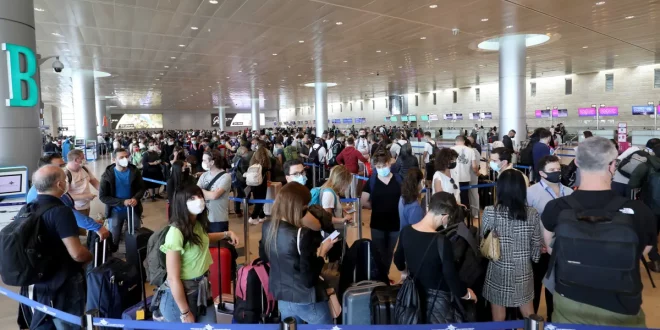Since the commencement of the Operation Al-Aqsa Storm, there has been a notable surge in the phenomenon of reverse migration from Israel. In addition to the significant impact of the resistance during this operation, the growing realization of the army’s limitations and a prevailing sense of insecurity have emerged as key factors driving Israelis to flee from Israel.
Impact of Operation Al-Aqsa Storm on Israeli Travel and Migration Patterns
In a recent development on November 3, 2023, the Israeli government issued an advisory urging its citizens to reconsider their travel plans outside the country and to avoid displaying Israeli and Jewish symbols while abroad. The Israeli cabinet claims that the reverse migration of Jews from Israel has coincided with a rise in anti-Semitic incidents and acts of violence targeting Israelis and the Jewish community in various parts of the world.
Furthermore, the Israeli government also advised its citizens to avoid traveling to countries that have been assigned a level four warning, indicating a serious threat. This advisory specifically includes the Middle East and Arab countries, the nations in the North Caucasus region, as well as neighboring countries of Iran.
Following widespread protests in several Arab and Islamic nations denouncing Israel’s aggression on the Gaza Strip, the Israeli government issued a warning to its citizens on October 21, 2023, advising against travel to Egypt, Jordan, and Morocco.
This advisory was issued in response to the heightened rate of Israeli emigration from Israel following the commencement of Operation Al-Aqsa Storm on October 7.
As per a report published by the Hebrew language publication “Marker” and based on statistics from the Israel Airports and Crossings Center, over 230,000 Israelis departed from Israel during the second week of Operation Al-Aqsa Storm.
Experiences of Israeli Emigrants during Operation Al-Aqsa Storm
The report by Marker features accounts from several immigrants, including Orit Katrich, who made the decision to leave Israel and relocate to Georgia. Katrich expressed that they initially believed the clashes would subside within a week, but that was not the case. It appears that Georgia has become a significant destination for Israeli individuals seeking refuge.
Katrich, who returned to Israel to bring his family along, shared the challenges they faced due to the surge in Israeli demand. He mentioned that finding a rental house in Georgia became difficult, leading them to settle in an inn instead.
In contrast, Tamer Goldenberg, who had immigrated from Canada to Israel in October 14, 2022, found himself and his family becoming refugees in Greece just one year later, driven by the fear of Operation Al-Aqsa Storm.
Tamer shared that his main task, a week after the conclusion of Operation Al-Aqsa Storm, was attending the burial ceremony of his friends who lost their lives in the conflict. Upon returning from the ceremony, Tamer’s wife informed him that they had to seek shelter due to the sound of sirens.
Despite Tamer’s attempts to reassure his wife and express their intention to carry on with their lives in Israel, she held a different perspective. She made the decision to immigrate to Athens, Greece, and they are currently residing in a rented house in the city.
Uri Helmash, a resident of Ashkelon for the past five years, recounts the events saying, “On the morning of October 7, as we woke up, we were startled to see a rocket strike near our home. Witnessing Palestinian paratroopers landing, I immediately understood that this situation was different from previous occurrences.”
He further explains, “Within a mere ten minutes, we hastily packed our bags and headed to the airport, intending to travel to Budapest, Hungary.”
Let’s Leave Israel Together
As reported by the Hebrew publication, the matter of Jewish emigration from Israel extends beyond individual cases. A Facebook group named “Let’s Leave Israel Together” has emerged, serving as a platform for sharing information and resources related to departing from Israel.
Nevertheless, this group initiated its operations in 2022 and actively orchestrated multiple protests targeting the policies of Benjamin Netanyahu, the Prime Minister of Israel.
Mordechai Kahana, an Israeli-American businessman, assumes leadership of the group, urging Israelis to depart from Israel as a form of protest against the far-right cabinet policies of Benjamin Netanyahu. However, with the onset of Operation Al-Aqsa Storm, the group’s activities took on a new dimension. Numerous Israelis joined the group to exchange their perspectives, share personal experiences, and actively encourage others to seek refuge outside of Israel.
Alon Nisan, a resident of Jerusalem and a member of the aforementioned group, voices his protest against the establishment of Israel in Palestine. He expresses his belief that while Israel could have been established in an African nation or even Argentina, the focus was directed towards Palestine. According to Alon, since the establishment of Israel, numerous Jewish lives have been lost as a consequence of this decision made by our Zionist predecessors.
The group’s involvement extended beyond its initial scope. As the conflict persisted, members of the group started promoting advertisements from travel, immigration, and real estate companies. These advertisements highlighted opportunities for individuals to live, settle, and find employment outside of Israel.
These advertisements frequently emphasized Eastern European countries, where anti-Israel sentiments and pro-Palestinian demonstrations were less prevalent.
However, the situation extends beyond this point. As the war enters its third week, the calls for Israel’s withdrawal intensify even further. In one instance, an Israeli citizen, who preferred to remain anonymous for security reasons, expressed their readiness to seek asylum in any country, along with their family of five, on the condition that the conflict in Israel comes to an end as soon as possible.
Why should we stay?
As the influx of emigrants from Israel grew, the Hebrew newspaper “Haaretz” posed a question to its readers in its online database: “Is leaving Israel the solution?” The responses were thought-provoking. One reader questioned the rationale for staying in Israel, pointing out that there are over 2 million Orthodox Jews who neither serve in the military, work, nor contribute taxes. The reader questioned why they should risk their lives while these individuals, in their view, were not actively participating in society.
Another reader expressed the view that Israel is often perceived as an aggressor, with protests erupting at the slightest provocation, as exemplified by the Operation Al-Aqsa Storm. Experts highlight that reverse migration had already been observed prior to the start of Operation Al-Aqsa Storm, driven by political crises faced by Israel. This assertion is supported by the frequent changes in Israeli cabinets and the multiple elections held in the past year.
As per these experts, the prolonged demonstrations that engulfed Israel for over a year, denouncing racial discrimination and the government’s perceived apathy towards the Jewish community’s conditions, along with the political crisis, also shed light on the economic and social crises within Israel. All of these factors are seen as significant threats to the existence of Israel.
In fact, Israeli society has been grappling with a social, political, and economic crisis since the commencement of Operation Sword of Al Quds in May 2021. Given this situation, it is understandable that individuals with travel visas would feel compelled to pack their bags and seek safety elsewhere, as they no longer feel secure in their own country.
Furthermore, the onset of Operation Al-Aqsa Storm has exacerbated the sense of social insecurity among Israelis, adding to their personal feelings of insecurity within the current regime.
The events of Operation Al-Aqsa Storm served as a stark realization for Israelis that even with barrier walls, advanced technologies, and a fully armed military, they cannot guarantee their protection. Consequently, the notion of emigrating from Israel has gained significant traction within their society.
An important aspect to consider in the ongoing Israeli immigration process is the impact of the significant blows dealt by Palestinians to the Israeli army. This has led many to believe that peace and security will remain elusive for Israel. Consequently, numerous experts hold the view that the current wave of immigration is not a temporary phenomenon and is unlikely to subside in the near future.
 Arab24 اخر اخبار الوطن العربي
Arab24 اخر اخبار الوطن العربي




